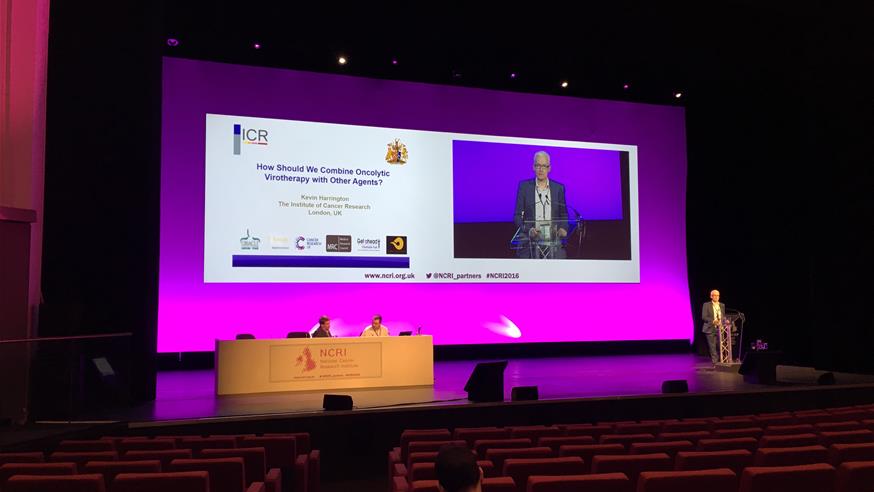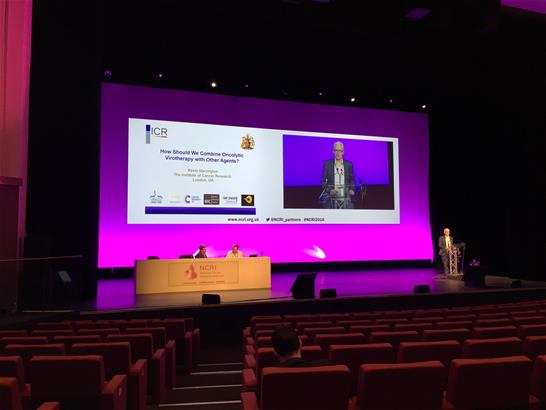
Professor Kevin Harrington presents his talk about virotherapy at NCRI 2016
In September, NICE approved a virus to be used for therapeutic purposes for the first time — to treat patients with advanced, inoperable melanoma.
Talimogene laherparepvec, or T-VEC, is a modified herpes virus that kills cancer cells by attacking them directly and by directing a patient’s own immune system against the tumour.
The idea behind using viruses to treat cancers is a relatively simple one. Our immune systems are pretty bad at ‘seeing’ cancers — partly because cancer cells look like our body’s own cells, partly because cancers are good at telling immune cells to turn a blind eye. But the immune system is very good at seeing viruses, so if we can infect tumour cells with viruses they can be sought out and destroyed.
Although T-VEC is the first of its kind — a new class of drug called oncolytic (cancer-bursting) immunotherapy — it is unlikely to be the last. Yesterday at the UK’s largest cancer conference, the National Cancer Research Institute's 2016 event (#NCRI2016), a panel of top UK researchers, chaired by Professor Alan Melcher of The Institute of Cancer Research, London, discussed what’s next for viral cancer therapies.
First in class
"The most beautifully engineered cancer therapy that exists." That’s the bold claim of another ICR researcher, Professor Kevin Harrington, about T-VEC. As the UK lead of the phase I, II and III clinical trials of the virus, he has invested many years of his life in taking this treatment to patients.
And after hearing Professor Harrington describe how T-VEC came to be — from isolating an aggressive form of the herpes virus from a postdoctoral researcher with particularly nasty and recurring cold sores, to the strategic addition and removal of genes based on a thorough knowledge of the biology of both the virus and human cells — I can’t help thinking he might be right.
So what’s next for this trailblazing virus? After successful phase III clinical trials and approval by regulatory boards in the US and Europe, the international team of researchers who brought us T-VEC are now looking at using viral therapy in other cancer types, and in combination with different immunotherapies, chemotherapies, targeted treatments and radiotherapy.
The combination of T-VEC with checkpoint inhibitor antibodies had fantastic results in early-stage clinical trials and a phase III trial of T-VEC plus pembrolizumab is underway – exciting news for patients.
Not just herpes
Herpes is not the only family of viruses with the potential to treat cancer. Dr Kerry Fisher from the University of Oxford and company PsiOxus is developing a cancer-killing genetically altered adenovirus — the family to which the flu virus belongs.
Like T-VEC, this new viral therapy, named as enadenotucirev, infects tumour cells while leaving healthy cells alone. The virus multiplies within the tumour cell and cause the cell to burst. And this messy cell death kicks the immune system into action against the tumour.
But unlike T-VEC with is injected into the site of the tumour, enadenotucirev is administered into the bloodstream so could additionally be used to treat hard-to-reach cancers.
Enadenotucirev is now in clinical trials for a number of cancer types, including bowel, ovarian and lung — and in combination with other immunotherapies to boost their effectiveness.
Natural virus
Not all viruses have to be engineered to treat cancer. When cells become cancerous they ‘rewire’ the cell in a way that means some of the cell’s viral defences are shut down.
Professor Melcher proposes using a type of naturally occurring virus called reovirus without any kind of genetic engineering to treat cancer.
His research in mice has shown that you could deliver the virus into the bloodstream and it would still only infect tumour cells and leave normal cells alone. His findings suggest it can actually reach brain tumours as well — an area hard to access with many cancer therapies.
Lab experiments with samples taken directly from a patient’s tumour show that reovirus-infected cancer cells attracts the immune cells to the tumour, and could boost the effectiveness of checkpoint inhibitor immunotherapies.
Professor Melcher hopes to begin first-in-human trials with reovirus in the new year.
Going viral
Although the idea of using viruses to kill cancer cells isn’t new – the connection was first made in the late 1800s, in fact — it feels like the technology and scientific understanding is beginning to get to where it needs to be to translate viral therapies into the clinic.
Immunotherapy is the current buzzword in cancer treatment. But in the next few years, when all of this exciting research and clinical development comes into fruition, perhaps oncolytic viruses will be the next — and we will see many more viruses being used to treat people with cancer.
Other posts from NCRI 2016
- Collaboration and communication at the heart of future cancer research
- Five reasons why we must prioritise innovative drug discovery to tackle cancer’s challenges
- Could exciting new treatments to block cancer evolution halt drug resistance?
- What we learned from the UK’s largest cancer conference
